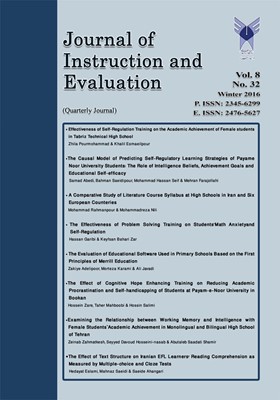A Comparative Study of Literature Course Syllabus at High Schools in Iran and Six European Counteries
Subject Areas : Educational PsychologyMohammad Rahmanpour 1 , Mohammadreza Nili 2
1 - دانشجوی دکتری مطالعات برنامه درسی دانشگاه اصفهان، مدرس دانشگاه پیام نور مراکز مریوان سروآباد و دانشگاه آزاد اسلامی واحد مریوان
2 - عضو هیئت علمی گروه علوم تربیتی دانشگاه اصفهان
Keywords: comparative study, Iran, high school, Literature course syllabus,
Abstract :
The present research was a comparative study of literature course syllabus at high schools in Iran and six European counteries. It was a qualitative research in which the content analysis of documents and survey was conducted. The data were collected through examining the documents related to the course syllabuse of different covnteries and semi-structured interviews. Regarding the content analysis of the documents, Beredy's proposed was used and for the survey, 15 Iranian experts in Literature were interviewed. The collected data were first summarized in tables and then analyzed. The results showed that the Literature course syllabus in our country is richer in content and approaches as compared to other countries. Moreover, it was found that the literature course syllabus in our country fosters optimal capabilities in students, among which are the ability to understand and interpret, and literary Knowledge. However, communicative skills and information processing skills, as one of the most important skills needed in today`s world, were overlooked, which need to be more emphasized. The other results of the study indicate that the literature course syllabus is challenging in terms of content and teaching method, which needs to be minimized
منابع
دانای طوسی، مریم و کیامنش، علیرضا(1388). عنوان رویکردهای نظری زیربنای تعریف سواد: شواهدی از برنامه درسی کشورهای آمریکا، انگلستان، کانادا، سنگاپور، سنگال، اندونزی و ایران، فصلنامه نوآوریهای آموزشی، سال هشتم، شماره 31، صص: 100-75.
سلیمانیان، حمیدرضا(1387). آسیب شناسی رشته "زبان و ادبیات فارسی" در بوته نقد آراء تربیتی، فصلنامه تخصصی ادبیات فارسی دانشگاه آزاد اسلامی مشهد، صص: 99- 123.
قادری دوست، الهام و دانای طوسی، مریم(1389). مطالعه اهداف و مؤلفههای آموزش مهارتهای زبانی(خواندن، نوشتن، گوش دادن و سخت گفتن) در برنامه درسی زبان فارسی دوره متوسطه ایران، فصلنامه نوآوریهای آموزشی، شماره 35، صص: 23- 65.
قاسمپور، حسین(1383). بررسی تطبیقی دیدگاهها، رویکردها و روشهای برنامه درسی زبان آموزی و ارائه الگویی برای برنامه ریزی درسی آموزش زبان فارسی، فصلنامه نوآوریهای آموزشی، شماره1، صص: 83-102.
قاسمپور مقدم، حسین، زندی، بهمن و بخشش، مریم(1387). بررسی مقایسه ای برنامه درسی آموزش زبان ملی ایران و آمریکا در دوره ابتدایی، فصلنامه مطالعات برنامه درسی، سال دوم، شماره 8، صص: 22-1.
ملکی، حسن(1390). مبانی برنامهریزی درسی آموزش متوسطه، تهران: سمت
ناصح، محمدامین(1388). بررسی رویکردهای زبانی در پژوهش های رشته زبان و ادبیات فارسی، مجله جستارهای ادبی، شماره 166، صص: 147- 163.
Connell, J. (2008). The Emergence of Pragmatic Philosophy's Influence on Literary Theory: Making Meaning with Texts from a Transactional Perspective. Educational Theory, 58(1), 103-122.
Dede, S., & Baskan, G. A. (2011). Theoretical basis of comparative education and suggestion of a model: comparative education council in Turkish education system, Procedia Social and Behavioral Sciences, (15), 3536-3542.
Douglas, B. H. (2001). Teaching by principles an interactive approach to language pedagogy. Second Edition by Addison Wesley Longman. Inc. Felski, R. (2008). Uses of literature. Malden, MA: Blackwell.
Lazar, G. (2000). Literature and language teaching: a guide for teachers and trainers. Cambridge: Cambridge University Press.
Moumou, M. (2005). The Literature Study Programme Trial: Challenging Constructions of English in the Seychelles. English Teaching: Practice and Critique, 4(2), 35-45.
Pieper, I. (2006). The teaching of literature. Retrieved July 29, 2010, from
Pieper, I., Aase, L., Fleming, M., & Samahaian, F. (2007). Text, literature and “Bildung”. Retrieved July 29, 2010, from http://www.coe.int/t/dg4/linguistic/ Source/Prague07_LS_EN.doc.
Pike, M. (2006). From Beliefs to Skills: The Secularization of Literacy and the Moral Education of Citizens. Journal of Beliefs & Values, 27(3), 281-289.
Sawyer, W., & Van den Ven, P.-H. (2009). Starting points. Paradigms in Mother tongue Education. L1 – Educational Studies in Language and Literature, 7(1), 5-20.
Slager, M. G. (2010). A comparative study into the literature curricula in secondary education in six European countries, Thesis of Master of Science in Education, University of Groningen August, 2010.
Van Iseghem, J. (2009). Legitimaties van literatuuronderwijs. Over het kluwen van onze goede bedoelingen en het doorknippen van de draad. Wie is er bang van het portfolio? Tweedaagse over literatuuronderwijs KU Leuven/SLO Nederlands.
_||_

